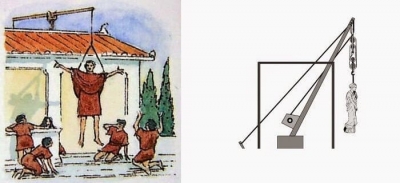
Deus Ex Machina is Latin for “God from the machine”. The first literary mention of the phrase can be traced back to Aristotle’s book on Poetics where the philosopher critiques this practice as a weak plot device. Originating in the Greek theatre, this phrase describes a theatrical trend of the time where the protagonist who is stuck in an unresolvable situation is saved by the intervention of a god or deity who would suddenly appear on the stage by either parting the clouds in the sky with the assistance of a crane which would lower the divine being to a platform or rise from under the stage by means of a trap door, hence the name god from the machine.
The Greek playwright Euripides was a great proponent of this practice. However, criticising this spectacle, Aristotle argued that this irrational plot device startled the audience and manipulated their response to the play, diverting their attention away from the plot and the relationships between the characters.
In modern times… Although we have come a long way in our storytelling, sometimes writers still struggle to give their stories a logical and purposeful ending. In such cases a Deus Ex Machina refers to those moments in a narrative when an otherwise unsolvable situation is resolved by the intervention of a person, power, or an (accidental) event that doesn’t have any precedent in the story. Such accidents tend to be viewed with disdain by modern audience, and are perceived as a sign of lack of initiative and creativity on the part of the author or creator.
A classic example of this in fiction is the ending of William Golding’s Lord of the Flies which shows a naval officer who happens to be passing the island saving the children and taking them back to civilisation. In movies, this device is exemplified by endings like that of Harry Potter and Chamber of Secrets where in the climax out of the blue, Faux the Phoenix flies down into the chamber and gives Harry the sorting hat with the Sword of Gryffindor allowing him to kill the monstrous Basilisk, and flies them out to safety when the chamber starts to disintegrate.
Picture Credit : Google




